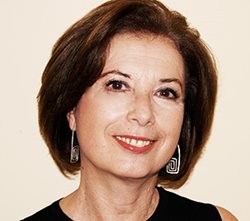13 February 2018
The Bilingual Advantage: Opportunities Abound in the San Diego Job Market
By Mario Koran

Thanks to her ability to speak multiple languages, Graciela Gomez-Vittori never stayed out of work for long. As a child in Argentina, Vittori said her father told her knowing multiple languages would open doors for her, and encouraged her to study French and English.
“He would tell me one day I’d thank him for that. And sure enough, I landed in this country.”
When Vittori first arrived in New York City, the job market was tough, she said. But she landed a job at a French bank, and later, with an airline–two jobs where multilingualism are a huge plus. And throughout her career, Vittori found side work as a private language tutor.
 Bilingualism makes professionals in virtually every sector more marketable, especially in a border city like San Diego. One study called Southern California one of the most linguistically diverse areas of its size in the country.
Bilingualism makes professionals in virtually every sector more marketable, especially in a border city like San Diego. One study called Southern California one of the most linguistically diverse areas of its size in the country.
Research and local hiring experts both highlight the fact that other skills being equal, employers overwhelmingly prefer to hire bilingual candidates over candidates who speak only English.
Yet, many employers still struggle to find bilingual professionals. One reason for this, Vittori said, is that despite the large population of Spanish-speakers in the region, many lack the ability to read and write in two languages–necessary skills for a true bilingual professional.
Today, Vittori is an instructor at UC San Diego Extension, where she teaches Spanish for Healthcare Professionals. In 2016, Extension began offering a specialized certificate program that consists of three courses. Since then, nearly 100 students have enrolled in the program.
Students don’t need a background in Spanish in order to take level one, but the courses become increasingly rigorous as they progress though Spanish for Healthcare Professionals I, II and III. Students come from various disciplines within the medical field, including nurses, physicians, endocrinologists, physical therapists and medical students.
Due to high demand for medical Spanish, the UC San Diego School of Medicine sponsors students enrolled in Spanish for Healthcare Professionals I. At least a third of each cohort of medical students is involved with UC San Diego’s student-run free clinic, which serves a diverse population of patients where knowledge of Spanish is crucial.
The courses help students gain medical vocabulary, proper grammar and include a lot of role playing exercises to help students grasp the subtle differences when communicating with patients from various cultures. Everything is tied to interaction with the patient, Vittori said.
“The courses are complex and we try to make them up-to-date. It’s crucial in the medical field to have a grasp of precise language. You can make a mistake that can cost a life,” Vittori said.
The courses provide a strong base for professionals in the medical field (as well as 30 BRN CEUs), and if students want to continue improving their language skills, Extension has options.
UC San Diego Extension offers four Spanish-focused certificates: Spanish for Healthcare Professionals, Spanish Language, Translation and Translation and Interpretation.
Translation, which refers to writing, and interpretation, which refers to speaking, demand a high level of expertise. The courses are designed for students who are already bilingual in Spanish and English. For those who pursue and complete the Translation and Interpretation certificate, however, the opportunities are plentiful. They may find work as court interpreters, interpreting at conferences, or writing and editing.
And more broadly, bilingual professionals can find a range of employment opportunities in San Diego, with the Department of Homeland Security, foreign civil service, airline industry or teaching in schools or language academies, for example.
From Vittori’s perspective, bilingual professionals will always have an advantage in the San Diego workforce. With its high number of Spanish-speakers, it’s possible for people to get by without knowing English–Spanish-speakers tend to congregate with other Spanish-speakers. More businesses and agencies are realizing that they must be the ones to reach out in order to provide effective care or service.
“To reach out effectively means we must know the culture. If we think materialistically, we need to do this because it will save lives and avoid problems. For hospitals, misinformation is a liability. In business, mistakes can cost money,” Vittori said.
Did you find this article helpful? Let us know in the comments!
Updated September 26, 2019